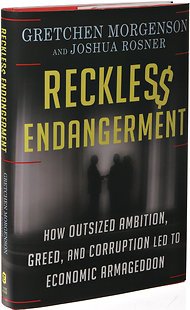|
Bad Loans Put Wall St. in a Swoon
Stocks fell broadly and sharply yesterday afternoon after a report on mortgage defaults indicated that the troubled housing market will weaken further before showing signs of improvement. Yesterday’s report by the mortgage bankers found that about 0.54 percent of all home loans entered foreclosure in the fourth quarter, the highest ever in the 37-year history of the survey. The problems were most heavily concentrated among subprime mortgages, but the default rates also increased on loans made to prime borrowers and on loans that are part of government programs.
Published: March 14, 2007
Stocks fell broadly and sharply yesterday afternoon after a report on mortgage defaults indicated that the troubled housing market will weaken further before showing signs of improvement.
Though default and foreclosure rates have only recently begun rising from historic lows, the report from the Mortgage Bankers Association unnerved investors because it showed that a record number of homes entered the foreclosure process in the fourth quarter. It also indicated that problems that had previously been limited to economically weak areas were cropping up in more vibrant places like California.
With shares of financial companies leading the way, the Dow Jones industrial average dropped 242.66 points, or 1.97 percent, to 12,075.96, and the Standard & Poor’s 500-stock index fell 28.65 points, or 2.04 percent, to 1,377.95. The fallout continued in Asia, with shares declining 1 percent to 3 percent in the major markets in mid-day trading today.
The slide echoed a sell-off two weeks ago driven in part by concerns about mortgages made to borrowers with weak, or subprime, credit and by a 9 percent drop in the Shanghai market. The S.& P. and Dow indexes are now down more than 5 percent since Feb. 20. [Page C11.]
Yesterday’s report by the mortgage bankers found that about 0.54 percent of all home loans entered foreclosure in the fourth quarter, the highest ever in the 37-year history of the survey. The problems were most heavily concentrated among subprime mortgages, but the default rates also increased on loans made to prime borrowers and on loans that are part of government programs.
“It’s a measurable weakening in credit quality across the board,†said Mark Zandi, chief economist at Moody’s Economy.com.
The rise in delinquencies will further strain the housing market, he said, because more houses will be put up for sale as foreclosures end in auctions, driving down home prices, which in turn will make it harder for struggling homeowners to refinance or sell their properties.
“This has a long way to play out,†he said, “because it now has this self-reinforcing quality that is seemingly kicking in and will extend the housing correction.â€
Delinquency and foreclosure rates were highest in states like Ohio and Indiana, which are suffering from the loss of high-paying manufacturing jobs, and Louisiana and Mississippi on the Gulf Coast, where a slow pace of reconstruction has worsened the pain from hurricane damage.
But defaults were growing, albeit from a low base, even in relatively prosperous California, the nation’s most populous state and home to some of its most heated housing markets until recently. About 2.03 percent of subprime mortgages in California entered foreclosure, which is more than the 1.83 percent of loans that were already in foreclosure there during the third quarter. Homes typically stay in foreclosure for several months.
Around the country, big states like Massachusetts, Colorado, Georgia and Texas also had high and rising foreclosure rates. The state statistics are not seasonally adjusted, unlike the national data.
The center of the country is exhibiting an “early warning sign of an infection that will quickly enough get to the coasts,†said Edward Leamer, an economist at the University of California, Los Angeles. Both Mr. Leamer and Mr. Zandi noted that they did not expect the mortgage problems to presage a recession as long as the job market remained healthy.
Still, the mounting troubles of subprime lenders have been raising fears of a broader financial fallout. New Century Financial, one of the biggest subprime lenders, said yesterday that the Securities and Exchange Commission and a federal grand jury were seeking documents in investigations into trading in its shares and accounting errors. New Century stopped making loans last week after Wall Street banks closed off its financing.
Another subprime company, Accredited Home Lenders, said that it was facing a cash squeeze because of margin calls from its banks and was considering "strategic alternatives.†Shares in the company fell 65.2 percent, to $3.97.
Residential Capital, the mortgage division of GMAC, reported an operating loss of $651 million for the fourth quarter, in contrast to a profit of $118 million a year ago, because of rising losses and reserves for future losses in its subprime business. General Motors will inject $1 billion into GMAC as a result.
According to the mortgage bankers’ survey, 6.14 percent of all home loans were past due or in foreclosure in the fourth quarter, up from 5.72 percent. The portion of subprime loans, which are given largely to poor and minority borrowers, past due or in foreclosure rose to 17.86 percent, from 16.42 percent.
The default rates are at their highest since 2002 and early 2003, when the economy was a lot weaker than it is today and unemployment was hovering close to 6 percent. By comparison, at the end of last year the unemployment rate was 4.5 percent.
Senator Christopher Dodd, the Connecticut Democrat who is chairman of the Senate Banking Committee, said the government might have to step in to provide aid to struggling homeowners. “The impact of losing 2.2 million homes I suspect will be in a lot of areas of our cities and towns that are already pretty hard hit,†Mr. Dodd told reporters after a speech at the National League of Cities, according to Bloomberg News.
Douglas G. Duncan, the chief economist of the Mortgage Bankers Association, said default rates were rising and would probably peak at the end of 2007 because about half the mortgages today were issued less than three years ago and borrowers are most vulnerable during the third and fourth years of their loans.
Other industry experts add that the current rise in defaults is also a function of looser lending practices in the last two or three years. Many lenders made loans without requiring down payments or verifying borrowers’ incomes with tax statements or pay stubs. Some borrowers — though it is hard to say precisely how many — may have also experienced payment shock from the resetting of adjustable-rate mortgages.
Furthermore, the slowing housing market has made it harder for borrowers to sell their properties or refinance, because their homes may be worth less than the outstanding balance on their loans.
Dozens of small companies that specialized in subprime lending have gone out of business or stopped making loans. Other companies like Countrywide Financial, the nation’s largest mortgage lender, are tightening standards.
In an appearance on CNBC, Angelo Mozilo, the chief executive of Countrywide, said investors were overreacting to the subprime problems. “This is now becoming a liquidity crisis, an unnecessary one,†he said. “There’s been a rush to judgment.â€
A top executive at Goldman Sachs, which was among the investment banks that financed subprime lenders, said credit problems appeared to be safely confined to the subprime category.
“I can’t predict the future, but as we sit here today, we really have not seen any contagion to the credit markets,†David A. Viniar, Goldman’s chief financial officer, said during a conference call with analysts and journalists about the firm’s record quarterly profits.
But investors pushed Goldman shares down 1.8 percent, to $199.03.
http://www.nytimes.com/2007/03/14/business/14lend.html?pagewanted=1&ei=5070&en=7de5a5324b69a7f6&ex=1176696000&adxnnl=1&adxnnlx=1176562322-iU9VgW6G8rp7lkwfT0NB2w |
 Home
Home  Home Buyer Resources
Home Buyer Resources  Foreclosure Latest News
Foreclosure Latest News  More bad loans highest in history
More bad loans highest in history 



